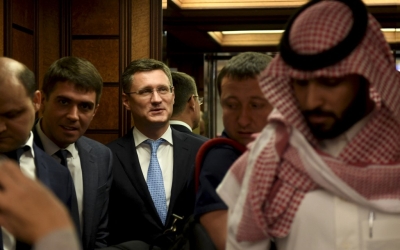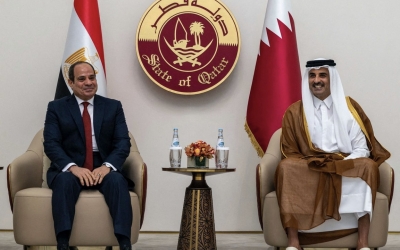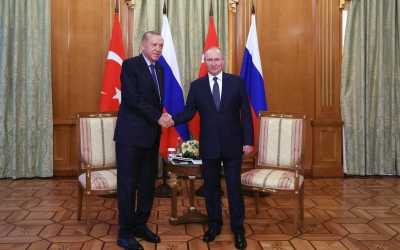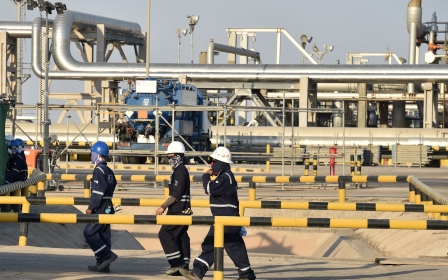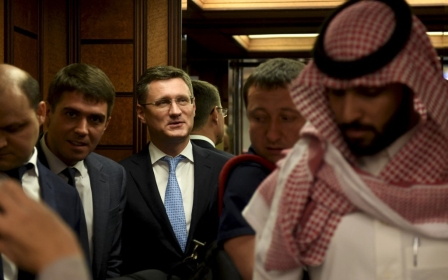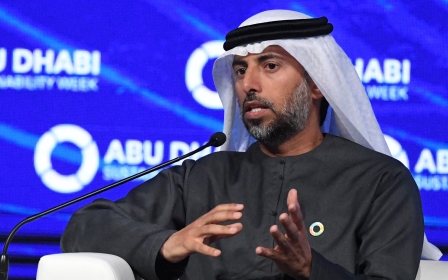US accuses Opec+ of aligning with Russia, Gulf states deny politics at play
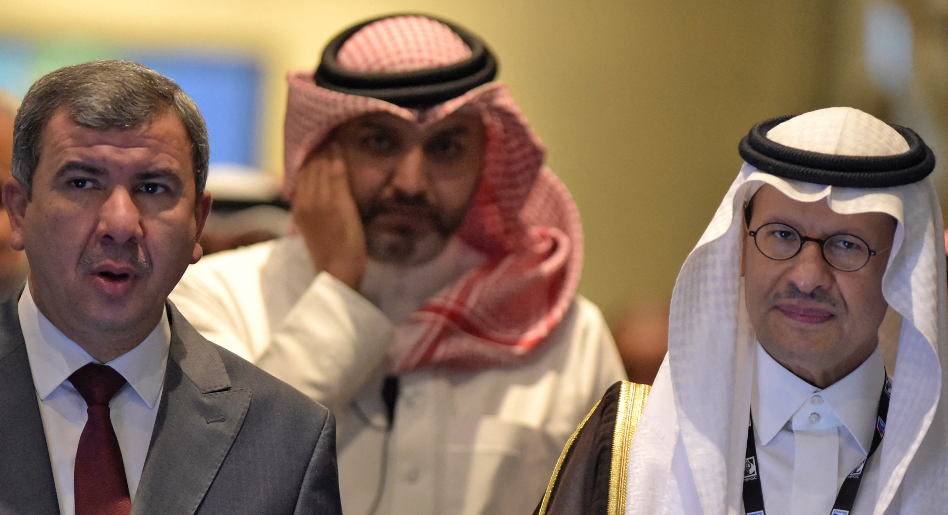
Ministers from a group of oil exporting countries led by Saudi Arabia and Russia agreed on Wednesday to slash output by two million barrels a day, prompting pushback from the US and igniting fears that it could propel global inflation higher.
The decision came despite heavy lobbying by Washington in Gulf capitals against the move.
"It's clear that Opec+ is aligning with Russia with today's announcement," White House press secretary Karine Jean-Pierre said aboard Air Force One.
"The president is disappointed by the shortsighted decision of Opec+," national security advisor Jake Sullivan and top economic advisor Brian Deese said in a statement.
'Tell me where is the act of belligerence'
- Abdulaziz bin Salman, Saudi energy minister
The cut, equivalent to two percent of daily global supply, was proposed by the Saudi-led Opec+ meeting in Vienna on Wednesday. It is substantially higher than the one million barrels analysts had expected, and the biggest cut since April 2020.
Saudi Arabia and Russia aim to support prices amid signs that the global economy is slowing, with the possibility of a recession on the horizon. Oil prices usually drop when global economic growth slows.
The decision to cut production is likely to put pressure on relations between the US and Saudi Arabia, with Wednesday's move seen as a win for Russia, particularly as it has faced battlefield losses in Ukraine, and reduced revenue from falling oil prices in recent weeks.
'Technical and not political?'
US President Joe Biden visited Saudi Arabia in July in a bid to repair strained ties with Saudi Arabia. Shortly after meeting with Saudi rulers, including Crown Prince Mohammed bin Salman, Biden said he expected Riyadh to take "further steps" to boost oil supply.
The backlash against Wednesday's production cut has already appeared in some quarters of Washington.
US Democratic Senator Chris Murphy, a noted critic of Saudi Arabia, said the Opec+ decision should lead to "a wholesale re-evaluation of the US alliance with Saudi Arabia".
Gulf states are pushing back against that narrative.
"Tell me where is the act of belligerence," Saudi Energy Minister Prince Abdulaziz bin Salman said during a news conference at Opec’s headquarters in Vienna, when asked if the cut would strain ties with the US.
"We shall act and react to what is happening to the global economy in the most responsible and responsive way."
The energy minister of the United Arab Emirates, Suhail al-Mazrouei, said the cut in production was "technical and not political".
OPEC Secretary-General Haitham Al Ghais, from Kuwait, said the cartel was trying to ensure “security [and] stability to the energy markets.”
“Everything has a price,” Ghais said. “Energy security has a price as well.”
Recession headwinds
Oil prices skyrocketed above $100 a barrel earlier this year after Russia invaded Ukraine.
While they have fallen about 32 percent from their highs over the past four months, the drop has been due mainly to fears of slowing economic growth - particularly in China - as opposed to increased production.
Some say Riyadh needs little motivation outside of economics to back the production cut.
"Saudi Arabia sees a recession coming next year and they don't want to be stuck with millions of barrels of cheap oil. They see now as the time to get the best price," a former senior US official told Middle East Eye, on condition of anonymity.
The kingdom's coffers have been buoyed by high crude prices. Earlier this year, Saudi Aramco overtook Apple as the world's most valuable company.
Saudi Arabia is expected to be one of the world's fastest-growing economies this year, and is using its oil wealth to push ahead with pro-business reforms and mega-projects such as Neom, designed to wean the country off its reliance on petrodollars.
And with an inflation rate of 2.8 percent, the oil-rich kingdom has also been more insulated from the price rises that are sweeping the globe - a hot-button political issue for Biden's party in the November midterm elections.
'Reduce Opec's control'
In response to Wednesday's decision, Biden called on his administration and US Congress to explore ways to "boost US energy production and reduce Opec's control over energy prices," the White House said.
The statement said Biden was ordering another dip into the country's Strategic Petroleum Reserve, with 10 million barrels set to be put on the market next month in an attempt to dampen price rises.
However, those reserves are fast emptying after record withdrawals were ordered by the administration, starting back in March. The reserves are now at their lowest level since July 1984, and it is not clear when the administration plans to purchase a refill.
Oil prices had risen about five percent since Friday, in anticipation of Wednesday's meeting. International benchmark Brent was up 1.86 percent, at $93.47 a barrel on Wednesday morning.
Analysts say the cut was likely to hinder western countries' efforts to cut Russia's profits on oil sales. The European Union has moved towards agreeing a G-7 plan to cap the price paid for Russian oil.
Also on Wednesday, European Commission President Ursula von der Leyen called for EU countries to make deeper cuts to gas demand, while proposing a raft of price cap measures designed to protect consumers and businesses.
In September, Russia cut gas supplies to Europe via the Nord Stream 1 pipeline in response to Western sanctions. Soaring energy prices have prompted Europe to look to alternative suppliers of gas, including Israel, Egypt, Algeria and Qatar to fill the void left by Russia.
Middle East Eye propose une couverture et une analyse indépendantes et incomparables du Moyen-Orient, de l’Afrique du Nord et d’autres régions du monde. Pour en savoir plus sur la reprise de ce contenu et les frais qui s’appliquent, veuillez remplir ce formulaire [en anglais]. Pour en savoir plus sur MEE, cliquez ici [en anglais].


